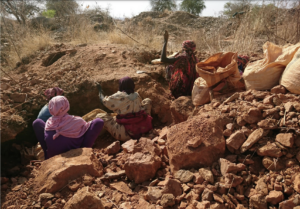New Ethiopian attack on Sudanese army forces in El Gedaref
On Wednesday evening, Ethiopian army and militia forces shelled the site of the Sudanese Armed Forces (SAF) in Jebel Abu Tuyour in eastern El Gedaref. Sudanese army forces clashed with Ethiopian reconnaissance forces near Wad Kouli.
The violent incidents occurred hours after border demarcation talks between Sudanese and Ethiopian government delegations in Khartoum concluded without an agreement. The negotiations reportedly failed because the Ethiopian delegation refused to recognise the 1903 border demarcation, saying that the British-Ethiopian treaty on the border was signed in colonial times.
 Army vehicle in Mufu, Blue Nile state (SPLM-N)
Army vehicle in Mufu, Blue Nile state (SPLM-N)
On Wednesday evening, Ethiopian army and militia forces shelled the site of the Sudanese Armed Forces (SAF) in Jebel Abu Tuyour in eastern El Gedaref. Sudanese army forces clashed with Ethiopian reconnaissance forces near Wad Kouli.
In a statement in Arabic on Thursday, Ethiopian Prime Minister Abiy Ahmed accused parties he did not name of planning, financing and implementing the recent confrontations between Ethiopia and Sudan on the border areas. These parties want to distort the relations between the two countries, and sow doubts between the two governments, he said.
Ahmed affirmed his government's determination to stop the clashes at the border.
Sudanese acting Minister of Foreign Affairs, Omar Gamareldin, emphasised the good relations with Ethiopia in an interview with Sky News Arabia on Thursday. There is only a difference of views on the border, he explained.
“Our borders with Ethiopia were demarcated in 1903, and are currently being renegotiated. We are bound by international laws and norms regarding resolving our border disputes with Ethiopia,” he said. “Every problem has a solution. We are neighbours, and we know how to negotiate with each other. […] When we are not able to obtain satisfactory solutions, the African Union is there.”
The violent incidents occurred hours after border demarcation talks between Sudanese and Ethiopian government delegations in Khartoum concluded without an agreement. The negotiations reportedly failed because the Ethiopian delegation refused to recognise the 1903 border demarcation, saying that the British-Ethiopian treaty on the border was signed in colonial times.
Since Sudan became independent in 1956, no clear demarcation of the 1,600-kilometre border with Ethiopia has been made. This has made it easy for Ethiopian militants to occupy fertile farmlands in eastern Sudan.
Occupied
Ethiopian army soldiers and militiamen earlier this week launched a series of attacks on the Sudanese part of the border area. The SAF said they recaptured territories in El Gedaref from Ethiopian forces.
Last week, four SAF troops were killed and 27 others were injured in eastern El Gedaref in an attack by Ethiopian forces.
Earlier this month, the Sudanese army regained control of Khor Yabis in El Fashaga. The area was occupied by Ethiopian militiamen (called shifta in the region) who cultivated by Ethiopian farmers for more than 25 years.
According to the El Fashaga Lands Committee, about 90 per cent of the lands in the border area of El Fashaga El Sughra has been occupied for years by the shifta.
Farmers in El Fashaga demanded in July that these lands be returned to them. The governor of El Gedaref supported them.
Radio Dabanga’s editorial independence means that we can continue to provide factual updates about political developments to Sudanese and international actors, educate people about how to avoid outbreaks of infectious diseases, and provide a window to the world for those in all corners of Sudan. Support Radio Dabanga for as little as €2.50, the equivalent of a cup of coffee.












 and then
and then